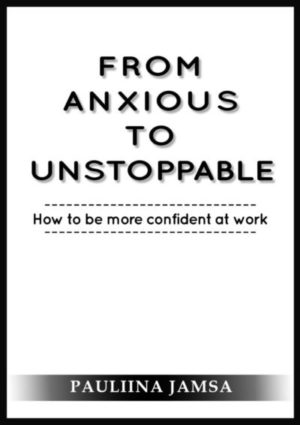Are you mad? You can’t just throw everything away!
My smile and excitement withered away. I had just received an offer for a job opportunity in Latin America, which I had applied for even if I had no experience in that industry nor role. It was amazing! I wasn’t expecting my boyfriend to react this way.
But I’m feeling stuck. I’m not happy.
He took a sip of his pint, looked at me with a dark expression on his face and started talking about my responsibilities, my age and the possibility of not having a job after the trial period.
You have no experience.
He convinced me not to take it.
I was only 28.
It’s never too late to change your career
I don’t have many regrets, but that one … I regret it to this day.
Change is scary and the older you get, the tougher it is to start a new career. We have more responsibilities, family and bills to pay. We have invested YEARS to get to the position we’re at.
But do you really want to spend rest of your working life doing what you’re doing right now?
It’s never too late to change your career and do what makes your heart sing.
In fact, it’s a must if you’re feeling miserable.
How to change careers if you’re in your 40s, 50s or 60s
The biggest change you need to make before you can shift your careers is in your mindset. Here are few of the most common limiting beliefs I have encountered during coaching:
1. If I change careers, I’ll be throwing everything I’ve achieved away
You might have invested a lot of time and effort to get to your current position and it is difficult to “throw it all away” to start a new career, especially if there’s an initial salary decrease.
Thing is … you won’t be throwing it away.
Most of our experience and skills are transferrable to other areas in life and in fact the can give us a seriously competitive advantage.
There’s a reason why many companies now recruit people from a completely different industry and why many of the most disruptive start-ups are founded by people who have no previous experience in that sector.
You’ll have a fresh perspective and ability to question what experts are taking for granted as “it’s always been that way”
For example, if you have worked in finance you’ll bring in the expertise with numbers and budget. You know how to convince senior management with ROI! If you have an eye for design and a passion for food, why not become for example a private chef in Rhodes, Greece.
If you’ve worked as a teacher, you’ll bring in your people and conflict management skills. 13-16-year-old kids are far more difficult to manage than colleagues and to be honest … sometimes office is like a kindergarten.
How to apply it to your own life:
Write down an answer for the following questions:
- What have you always enjoyed doing in your past and current roles e.g. presenting, getting things organized, speaking with people?
- Which skills have you got that can be applied in this new career you’re imagining e.g. managing people, organizing an event, accounting?
- What people always come to ask advice for at work and in private life e.g. how to set up a project, how to estimate budget for a year, how to eat healthier?
2. I’m too old to learn new tricks
I’m not a big fan of defining people only based on their age. Someone who’s in their 50s can have a much more flexible, energetic mindset than someone in their late 20s who has given up on life and stopped learning.
If you have an open mind and a curious mindset, you can’t help but learn!
Remember that all you need to do is to understand the basics so you can keep up the conversation and understand the results. Yes, younger generation was born with digital and new technology, but that’s not the area where you need to compete.
Let them do the digital. Play with your strengths.
Do you realise that the most of the senior people buying the products, especially B2B, are your age? You understand their channels, how they think and the way they consume.
This is invaluable insight for sales and marketing.
If you’d like to change your career and become a personal trainer or a coach, for example, pick people around your age or older as the target. They are more likely to relate to you than to younger people. You’ll know exactly where to reach them and how to talk to them: you get it!
Keep the curious mindset and outsource / delegate the complicated new stuff for others.
How to apply it to your own life:
Write down an answer for the following questions.
- What are the three key areas you must learn in the new career you want e.g. digital marketing basics, personal training basics, how to set up my own business?
- Which areas can I delegate or outsource to others e.g. creating a website, editing video?
- What are three little steps you can do in the next 24-48h to get the basics right in this area e.g. sign up for a course, call my friend who has a business, speak with that personal trainer in my gym?
Now go and do it!
3. No one wants to hire someone who’s going to retire soon, they all go for millennials
Some companies do, but not everyone.
There is no such thing anymore as a secure job or a stable work force. Big problem companies struggle with is that millennials tend to be job hopping every two-three years and get poached by other companies right when they start knowing the products and optimizing the process. All that money and effort spent training them seems to go to waste.
Suddenly 10-20 years you have left do not sound that bad, eh?
Besides, sometimes us millennials can act like over-enthusiastic headless little chickens running around the company as we don’t always consider the long-term vision, understand company politics nor how to manage more senior workforce.
Pitch these problems to the hiring manager and present yourself as the solution: they’ll know that if they hire you, they’ll get a stable, experienced work force who’ll keep everything running while rest of the work force changes.
How to apply this to your own life:
Write down an answer for the following questions:
- Considering the above, what are your biggest strengths compared to the younger workforce?
- Do you have an example / story of the time you have acted in a mature, productive way? If yes, write main points down.
- In the new career you’re imagining to have, where could your maturity add value?
It’s what’s inside you that matters
When I did the FaceApp challenge to look 50 years older, I definitely wasn’t going to share my pic.
It wasn’t funny. I looked horrible. It shocked me.
But I changed my mind.

We all grow old, it’s nothing to be ashamed of.
True beauty is not in the face. It shines through our eyes, our laugh lines and how we make others feel around us. Our inner beauty never needs filters.
When you’ve lived a life true to yourself it shows.
Seeing myself around 80 years old made me realise even more how important it is to find our purpose. To live a life in our own terms, filled with joy and happiness.
Imagine yourself 10-20 years from now and ask yourself: Is what I’m doing right now going to matter to me in life? What will I regret the most when I’m old?
I don’t know about you, but when the time comes I prefer laugh lines to a smooth mask of indifference.
Live a life without regrets.
It’s never too late x
Pauliina
Ps. If you’re not sure what you’d want to do or what your purpose is, I recommend you reading these two articles: What not to do when planning your next career move and What would you regret the most if it was your last day.

